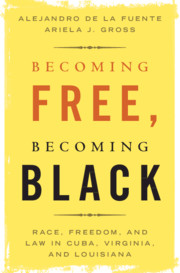Book contents
- Becoming Free, Becoming Black
- Studies In Legal History
- Becoming Free, Becoming Black
- Copyright page
- Contents
- Figures and Tables
- Preface
- Abbreviations
- Introduction
- Chapter 1 “A Negro and by Consequence an Alien”
- Chapter 2 The “Inconvenience” of Black Freedom
- Chapter 3 “The Natural Right of All Mankind”
- Chapter 4 “Rules … for Their Expulsion”
- Chapter 5 “Not of the Same Blood”
- Conclusion
- Notes
- Index
Chapter 3 - “The Natural Right of All Mankind”
Claiming Freedom in the Age of Revolution, 1760–1830
Published online by Cambridge University Press: 16 January 2020
- Becoming Free, Becoming Black
- Studies In Legal History
- Becoming Free, Becoming Black
- Copyright page
- Contents
- Figures and Tables
- Preface
- Abbreviations
- Introduction
- Chapter 1 “A Negro and by Consequence an Alien”
- Chapter 2 The “Inconvenience” of Black Freedom
- Chapter 3 “The Natural Right of All Mankind”
- Chapter 4 “Rules … for Their Expulsion”
- Chapter 5 “Not of the Same Blood”
- Conclusion
- Notes
- Index
Summary
Chapter Three studies the impact of the Age of Revolution on the formation of communities of free people of color. Across the Americas, the chaos of war, ideologies of equality and liberty, and the specter of slave rebellion in Haiti, inspired legal forms of claims-making and created new opportunities for emancipation. The period from 1763 through the 1820s could be said to be the era of greatest commonality across these jurisdictions. During this period, both Louisiana and Virginia developed significant communities of free people of color, especially in urban areas. Yet freedom was often the unintended consequence of retrenchment and reform rather than revolution. The growth of these communities had radically different political connotations. In Virginia, manumissions became linked to wider debates about slave emancipation and were opposed as a dangerous step toward black citizenship. In Cuba–and by extension in Louisiana under Spanish control–manumission was linked to the regulation of customary practices that had nothing to do with abolition or with republican notions of equality but instead concerned traditional understandings of vassalage, status, and royal justice.
Keywords
- Type
- Chapter
- Information
- Becoming Free, Becoming BlackRace, Freedom, and Law in Cuba, Virginia, and Louisiana, pp. 79 - 131Publisher: Cambridge University PressPrint publication year: 2020



